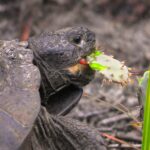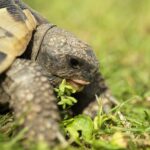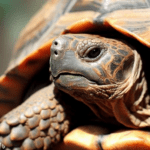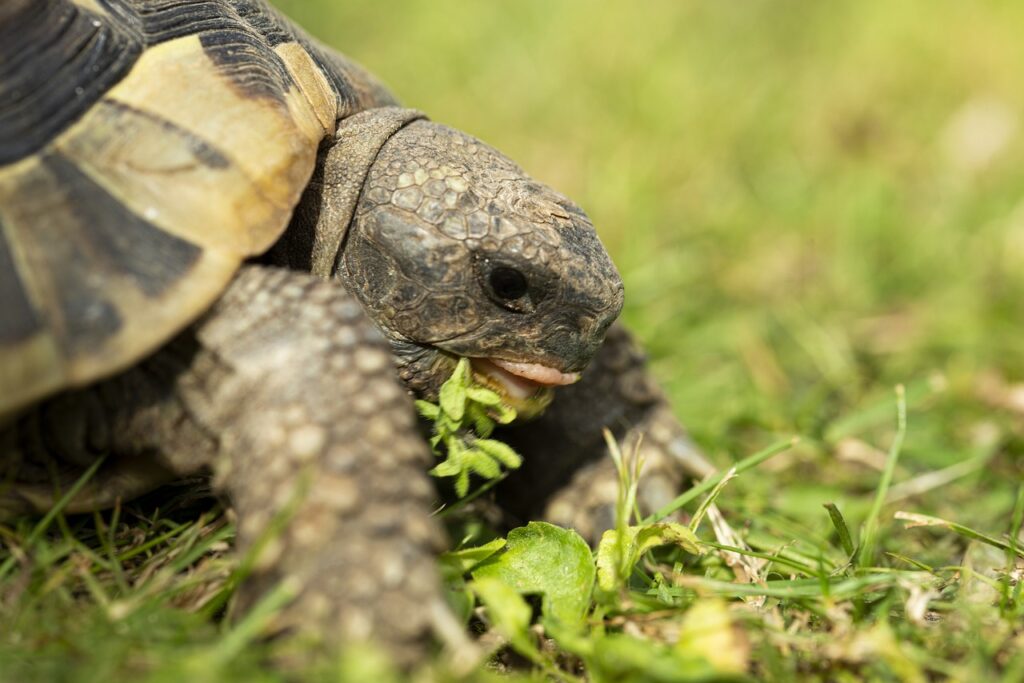
Image: Tortoise Meal feed Pixabay
Tortoises have unique dietary needs. They are herbivores, meaning they eat plants. Leafy greens, such as kale, spinach, and dandelion greens, provide essential vitamins and minerals. Fruits, like strawberries or melons, are occasional treats.
But not all grasses are safe for tortoises to eat. Some contain toxins or are hard to digest. A true story tells of a tortoise that fell ill due to eating the wrong grass. Luckily, with intervention, it recovered and learned its lesson.
Identifying safe grasses prevents any harm or discomfort. Consult an expert or do research to ensure these gentle creatures thrive on their diet.
Key Takeaways
- Tortoises can eat grass, but it should not be the main component of their diet.
- Grass can be a good source of fiber for tortoises, but it lacks certain essential nutrients.
- It is important to provide a varied diet for tortoises that includes a mix of grasses, leafy greens, and other vegetables.
- Avoid feeding tortoises grass that has been treated with pesticides or herbicides.
- Monitor the amount of grass consumed by tortoises to prevent overeating and potential digestive issues.
- Always consult with a veterinarian or reptile specialist for specific dietary recommendations for your tortoise.
Explaining the importance of a balanced diet for tortoises
A balanced diet is important for tortoises. It provides them with necessary nutrients for health and growth. Grass, leafy greens, veggies, and fruits are needed for their nutritional needs. These foods give vitamins, minerals, fiber, and water for digestion and well-being.
Grass is an important part of a tortoise’s diet. It provides fiber for proper digestion. But, not all grass is suitable. Check it’s free from pesticides and chemicals. Don’t feed grass with fertilizers or herbicides.
Leafy greens like kale, spinach, collard greens, and dandelion greens are essential. They have vitamins like A and calcium for health. Veggies like carrots, bell peppers, and squash offer additional nutrients like vitamin C. Fruits like strawberries and melons can be given occasionally as treats, but not regularly due to their high sugar content.
It’s also important to provide fresh water daily to prevent dehydration and keep organs working. But, don’t give too much protein or high-fat foods like meat or dairy products. These can cause shell deformities and other health issues. Stick to a balanced vegetarian diet for optimal health.
A diverse, balanced diet will keep tortoises healthy and make life better!
Can tortoises eat grass?
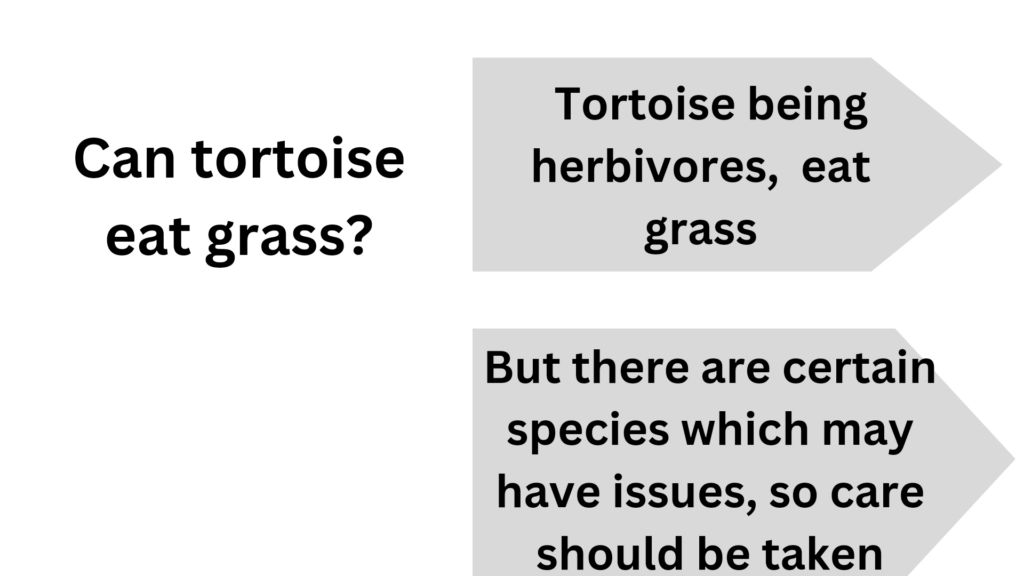
Tortoises, being herbivores, can eat grass. However, not all species can digest it without issues. Grass can provide fiber and vitamins, but it needs to be free from pesticides and other harmful chemicals. Additionally, each species may require different diets; some tropical tortoises may prefer a leafy diet over grass-based ones.
In the 1960s, Dr. John Harper found that Galapagos tortoises had improved health and higher reproduction rates when grass was a part of their diet. Still, it should not be the only one. To ensure a tortoise’s health and longevity, it is essential to provide them with suitable dietary choices.
So, before giving your tortoise a grass feast, know that it won’t just give them joy, but also you a lawn-mowing break!
Pros and cons of feeding grass to tortoises
Grass can be both advantageous and damaging to tortoises.
- Benefits:
- – Fiber in grass can help tortoises digest food.
- – It is a great source of hydration, especially for species that eat grass in the wild.
- – Grass holds essential nutrients like calcium and vitamin A, which are beneficial for tortoise health.
- – It lets tortoises show natural foraging behavior, boosting mental stimulation and physical activity.
Cons:
- Some grasses may contain high levels of oxalic acid or other toxins, which can lead to health problems if eaten a lot.
- Pesticides and fertilizers on grass can be toxic to tortoises.
- Grass in areas with herbicides might also harm tortoises.
For your tortoise’s safety when it eats grass, recognize safe varieties and avoid contaminated ones. This will reduce the risks linked to ingestion.
Surprisingly, according to Dr. Melissa Kaplan from an article posted on Reptilesmagazine.com, some tortoises depend totally on eating certain grasses from their native habitats.
The grass may look greener on the other side, but make sure your tortoise doesn’t get too excited and start a turf war!
Guidelines for feeding grass to tortoises
Feeding grass to tortoises needs cautious thought and following special instructions. These tips make sure the health and safety of these one-of-a-kind creatures. Here are some crucial points to remember when feeding grass to tortoises:
- Variety is essential: Offer a diverse range of grasses like Bermuda, Timothy and Fescue in their meals. This makes sure they get a balanced diet.
- Organic is best: Keep away from using grass that has been treated with pesticides or herbicides. Go for organic grass to limit the risk of dangerous chemicals.
- Harvesting rules: Make sure the grass comes from a clean place. Avoid toxic plants, fertilizers and pollutants.
- Cleanliness is important: Clean the grass before giving it to your tortoise. This stops the absorption of dangerous substances and reduces risk of illness.
- Consistency is key: Keep to the same feeding routine for your tortoise’s grass. This sets up a pattern and guarantees they get proper nutrition on a regular basis.
- Watch portion sizes: See how much grass your tortoise consumes each meal. Overfeeding can cause weight gain or digestive issues, so it’s essential to offer them the right amounts.
Furthermore, not all tortoise species have the same dietary needs. Research specific information about your tortoise breed to make sure you give them suitable grass.
Pro Tip: Mix different types of nutrient-rich greens with the grasses in your tortoise’s food. This adds variety and boosts their nutritional intake, promoting overall health and well-being.
Sprinkle in some grass to your tortoise’s diet – they might just give you a slow clap!
Recommendations for incorporating grass into a tortoise’s diet
Grass can be great for tortoises! Here are some tips to keep in mind:
- 1. Variety is key: Different types of grasses ensure balanced nutrition.
- 2. Organic is best: Organic grass is best for avoiding harmful chemicals.
- 3. Freshness matters: Offer freshly cut grass, not dry or wilted.
- 4. Avoid toxic plants: Do research to know which plants are safe for consumption.
- 5. Moderation is key: Offer grass in moderation, along with other vegetables and fruits.
It’s important to always consult with a vet or reptile specialist about incorporating grass into a tortoise’s diet.
In the ancient world, tortoises were admired for their wisdom and longevity. In Egyptian mythology, Huh was the turtle god who represented balance and endurance.
Let’s make sure our tortoises have a healthy diet with grass! Moderation and knowledge are key.
Frequently Asked Questions
Q: Can tortoises eat grass?
A: Yes, tortoises can eat grass. Grass is a staple part of their natural diet, especially for herbivorous species.
Q: Is it safe for tortoises to eat grass?
A: Generally, grass is safe for tortoises to eat. However, it’s important to ensure that the grass is free from pesticides, herbicides, or any chemicals that could be harmful to them.
Q: What type of grass can tortoises eat?
A: Tortoises can eat various types of grass, including Bermuda grass, fescue grass, and ryegrass. It’s best to offer them a mix of different grasses to provide a balanced diet.
Q: How often should tortoises be fed grass?
A: Tortoises can be fed grass daily, as it is an essential part of their diet. However, the quantity might depend on the species, age, and overall health of the tortoise. Consulting a veterinarian is always recommended.
Q: Can tortoises eat freshly cut grass?
A: Yes, tortoises can eat freshly cut grass. However, it’s crucial to make sure that the grass hasn’t been treated with any chemicals and hasn’t come into contact with fertilizers or animal waste.
Q: What are the benefits of feeding grass to tortoises?
A: Feeding grass to tortoises provides essential nutrients, fiber, and hydration. It aids in digestion and helps maintain good overall health.
Conclusion
Grass is an essential part of a tortoise’s diet, supplying vital nutrients and aiding digestion. But, a diverse mix of veggies and fruits is needed for good health. Leafy greens like kale, dandelion, and collard are excellent choices.
Also, consider the calcium to phosphorus ratio. Grass has a lot of phosphorus versus calcium, which can cause imbalances. Balance it out with calcium-rich goodies like cuttlebone or reptile-specific calcium powder.
Need more advice? Always research and consult a professional about the right diet for your tortoise. A varied diet will ensure good health and well-being.
References

